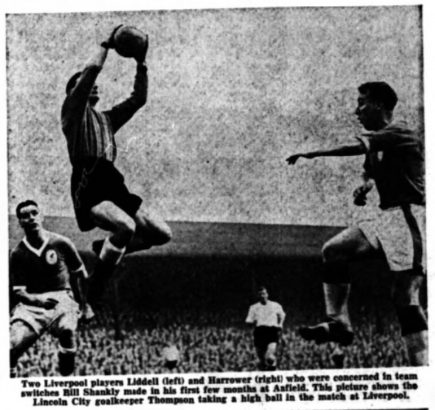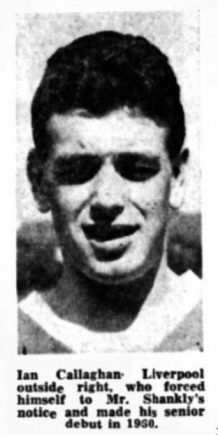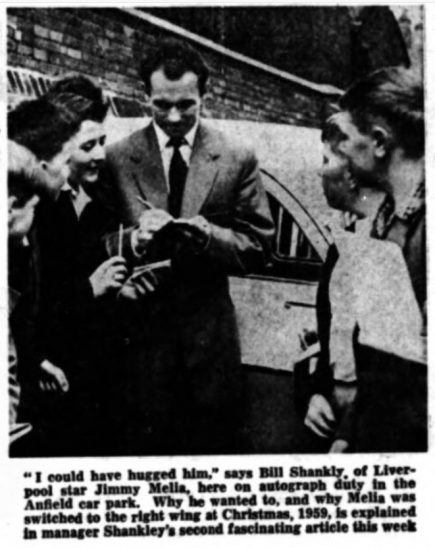May 19, 1962
Last week I described how I came to Anfield, what problems forced me and how I set about solving them. While I was still finding my way about (literally and metaphorically), the revised schedule for training was put into operation and in this I joined. This was completely different from the old methods and I must say that the boys responded splendidly.
After every training session, we had tactical talks in which we endeavoured to cover everything which could conceivably happen – free kicks, corners and throw-in. We put in a tremendously hard week’s work which culminated on the Saturday with a game against Cardiff at Anfield. You can imagine that everybody connected with the club was keyed up to a high pitch.
I remember most distinctly the final talk I had with the team prior to the game. In finishing this, I asked them if they had enjoyed the week’s work and the unanimous way in which they replied showed the enthusiasm with which they were imbued. They went on the field full of the greatest hopes and determination, but during the game they showed only the rarest glimpses of the form of which I knew them to be capable.
We lost 4-0. After the way in which we had all trained and worked, this was sheer anti-climax and the club was enveloped in an atmosphere of gloom and dejection.
It was not that anybody expected a mediocre side suddenly to be transformed into world-beaters as the result of one week under a new manager with new methods, but sheer disappointment after having grafted really hard all week, to have been soundly beaten when we fully expected to win.
I went to see the boys while they were still dressing and was greeted by Jimmy Melia. All he said was “we’re sorry, boss, we let you down. We were too eager to impress.”
I am not a demonstrative sort of man, but I could have hugged Jimmy. To hear such sentiments as this, so simply expressed, gave me a feeling of what I can only describe as sympathetic pride.
Tried hard
I was sympathetic because I knew how really hard they had tried, but this was mixed with a wonderful feeling of pride in being associated with a set of fellows whose first thought, even though terribly disappointed themselves was to apologise to me for what they considered their own shortcomings.
I then knew with certainty that I had “arrived” at Anfield and had with me a nucleus of players who respected me and were willing to fight for me, and alongside me.
After they had changed we had a heart to heart talk, for by then I had matters in their true perspective.
I told them that this defeat was the best possible thing which could have happened, because, in my experience, more is learned from defeats than from victories.
I was not prepared to condemn any player on one poor game only and we should all be wiser men if we considered what lessons were to be learned from what had happened.
We held a post-Morten on the game considering it from every angle, but although what Jimmy Melia had said was perfectly true. It was, in addition, very apparent to me that certain positions needed strengthening.

I then saw the directors and told them the same things that I had told the players. While there must be a natural feeling of disappointment, any show of gloomy pessimism was quite unwarranted.
This was the Christmas period (the Cardiff game was played on December 19) and we therefore had the usual heavy fixture list immediately in front of us. The next game was on Boxing Day, when we visited Charlton.
We fielded the same team as the one which had lost to Cardiff and although we lost 3-0, there was a great improvement in the standard of play, but, of course, there were weaknesses, which had to be remedied. One of these was on the right wing.
The first game I saw at Anfield was a reserve team game played at the time when I first came to Liverpool to look around. This match was against Manchester City Reserves and Liverpool won 5-0.
Jimmy Harrower was in this reserve side and he had impressed me as a footballer of considerable ability.
He had continued to play some good stuff in the Central League, and I therefore promoted him to the first team as an inside forward to make the best use of the talent available. This enabled me to utilise Jimmy Melia on the right wing.
Melia plan
It was not my intention that Jimmy should be converted to a winger, because he was, and, is, a natural inside forward, but this was a case of expediency, as we really had not wings of sufficient experience among the juniors to play in the senior side.
The plan was for him to be a deep-lying outside right with Roger Hunt playing the role of a poacher at centre forward alongside Dave Hickson.
This, them was the revision which I made for the return game against Charlton on December 28, and we were all considerably heartened by precisely reversing the result of the Boxing Day game.
I therefore continued with the same line-up and we had the satisfaction of going to Hull for the first game in 1960 and coming away with two points.
A week later we met Leyton Orient in a Cup-tie at Anfield and once more we were successful. The point I remember about this game was the curious scoring – Roger Hunt got both goals, one a few seconds after the start and the other seconds before the final whistle.
I had, in the meantime, been searching for an outside right. One possibility was Sammy Reid, then with Motherwell.

He was really an inside-forward but I felt that, on account of this small stature, he could be converted into a useful winger without a lot of difficulty.
He did, in fact, come to Liverpool, but after only a short stay was transferred to Falkirk. For the record he played a big part in Falkirk’s promotion effort.
After Reid decided not to stay with us, the search for suitable talent still continued, but in the meantime I had to make do with the players I had available.
The same team therefore did duty against Sheffield United on January 16. Once we got maximum points, winning 3-0 in spite of losing the services of Dave Hickson for part of the game. He had got at cross purposes with Cec Coldwell and was sent off.
Our next match was a really wonderful one against Middlesbrough, who played some magnificent football and our own boys matched it, and even surpassed it at time.
At half-time we were leading 3-1, but the opposition pegged us back in the second half and we finished with a 3-3 draw which was a fitting result to a splendidly fought match.
Thus the introduction of Harrower and the switch of Melia to the wing had shown sustained results as we had obtained seven points out of the last eight possible, and, in addition had beaten Leyton Orient in a Cup-tie.

The following week brought this minor run of success to an end when we were knocked out of the Cup by Manchester United, without being disgraceful.
It had been apparent, however, that Jimmy Melia was not happy on the wing. He lost his form and his place in the team.
We still had been unable to find the winger who would satisfy my requirements and with no youngster of sufficient experience available, I brought back Billy Liddell to fill the outside right position for the game at Plymouth.
Kept his zest
This match notched another point and Billy continued on the wing for another ten games. He was long past the age when most players have hung up their boots and the edge had gone from his speed, but he still retained his zest for the game and continued to delight the thousands of fans by his presence in the side.
However, as I knew ad as Billy knew, this was not the answer to our problem, but he did fill the position for this period and during it young Ian Callaghan had been continually bringing himself to my notice by his good displays in the Reserve side.
Such consistency brought its reward when I introduced him to senior football for the game against Bristol Rovers at the age of 17. This game was won 4-0 and he retained his place for the last five games of which we won four and drew in the other.
In Callaghan I felt that we had a youngster who showed real promise of becoming a Liverpool player of the future. At the time he was really not ready for big time football, but the experience which he had gained had been invaluable to him.
This brought me to the end of my first half season with the club. We finished third once again, just missing that coveted promotion.
In spite of Callaghan’s promise, I felt that a more experienced winger was a necessity and in reviewing the games since my arrival I became more than ever convinced that my earlier assessment of the club’s strength was correct.

In spite of our excellent finish, I knew that we felt a long way short of being a championship team.
(Source: Liverpool Echo: May 19, 1962)

